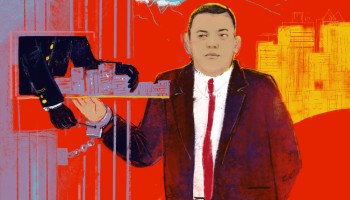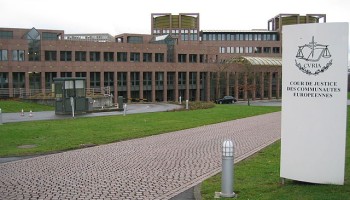Judge Konstantin Penchev and his son, lawyer Lyubomir Penchev, have declined to answer reporter’s questions about the origin of their wealth after Lyubomir was outed as the ultimate beneficial owner of a company in Luxembourg that holds more than 600,000 euros (US$726,000) in seemingly unaccountable assets.
As revealed last week by Bivol.bg — an OCCRP partner and contributor to the recent OpenLux Project, which seeks to expose the extent of obscure ownership structures in Luxembourg — Lyubomir Penchev’s company Promobelle S.A. in 2014 received a loan in the amount of its current holdings, and the following year acquired real estate worth more than 400,000 euros ($484,000).
The origin and purpose of these funds remains unclear.
“This information really upset me. I trusted K. Penchev,” one Facebook post said.
Bulgaria is according to Transparency International perceived as the most corrupt country in the European Union. Many citizens seem to be fed up with this title, and suspicious of any wealth they believe is disproportionate to a person’s income.
“I’m terrified. For how long??? How long?????” another Facebook user asked.
The younger Penchev did not respond to questions submitted by Bivol.bg, while his father — who was nearing the end of his term as an ombudsman at the time of the loan, and has since served as chairman of the Supreme Administrative Court — simply declined to take reporters’ phone calls.
Furthermore, journalists also found that, again in 2014, Lyubomir bought a large apartment worth 200,000 euros ($242,000) located on the most expensive street in the Bulgarian capital of Sofia, while Konstantin also purchased another property in the city for 100,000 ($121,000) around the same time.
The older Penchev has historically enjoyed a good reputation as a legal professional, and his integrity in public office has not been questioned so far.
Media Blackout
Questions regarding the provenance of the Penchev family’s wealth have failed to provoke any reaction from Bulgaria’s political parties or public institutions. Bivol.bg’s findings were not initially covered by any of the country’s mainstream media, with the exception of Bulgarian National Radio.
Nor has there been any coverage of a petition from the civil anti-corruption association BOEC requesting that the prosecutor’s office undertake an investigation into the family’s assets.
Tatiana Christy, a Bulgarian-American journalist wondered on Facebook why no media had picked up Bivol’s story, and whether the OpenLux findings were of any interest to them at all.
"Why is even RFE is silent?” she asked, referring to Radio Free Europe. “Are they waiting for the State Department to authorise them? Are they waiting for the anti-corruption officer at the US Embassy?”
RFE has since published a story on the investigation.
According to Bulgarian law, constitutional judges enjoy immunity from criminal prosecution. It is up to them whether to lift that immunity in respect of any proposed investigation into a member of the Constitutional Court, which generally only happens in cases of serious crime and under pressure from the Prosecutor General.
"The fact that no one is talking about OpenLux, especially the big TV [channels], is a typical example of certain topics missing on their agenda or being taboo," Jana Popova, a professor of journalism at Sofia University, told Bulgarian National Radio.
She referred to media unwillingness to cover alleged corruption in the upper levels of government - a concern that has been consistently echoed by international free-speech monitors.
Bulgaria currently sits at the bottom of the European Union media-freedom rankings. The European Commission continues to monitor the ongoing reform of Bulgaria’s judiciary, and has often criticized a perceived reluctance to pursue investigations into high-level corruption.






